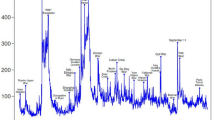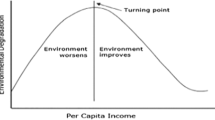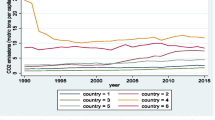Abstract
High levels of CO2 emissions are extensively cited as one of the main global concerns nowadays. Therefore, researchers have been investigating the factors that affect CO2 emissions. In the prior literature, several social, economic, and political drivers of CO2 emissions have been investigated; however, there is a dearth of the literature on the impact of geopolitical risks (GPR) on CO2 emissions. Hence, the objective of this study is to explore the impact of GPR on CO2 emissions in the case of the BRICS countries while controlling the effects of population, GDP, non-renewable energy, and renewable energy consumption. The study uses the recently developed GPR index, proposed by Caldara and Iacoviello (2018), and the AMG (augmented mean group) estimator method. The findings document that GPR escalates CO2 emissions. That is, a 1% increase in GPR escalates CO2 emissions by 13%. Moreover, it also reports that renewable energy consumption impedes CO2 emissions. In contrast, GDP, population, and non-renewable energy consumption surge CO2 emissions. The study also proposes a few policy implications based on the findings: (1) policymakers and government officials should try to limit GPR through peace treaties, agreements, and negotiations; (2) share of renewable energy in total energy consumption should be increased in order to plunge CO2 emissions.

Similar content being viewed by others
Notes
See Caldara and Iacoviello (2018) for further details (i.e. construction of GPR index).
In addition to this, we also incorporated other control variables (e.g. trade, financial development, FDI, and human capital) in the model, but these variables are found statistically insignificant after estimating AMG (augmented mean group) estimator. Hence, we dropped them from the model.
The span has been chosen on the basis of data availability.
As suggested by Baker et al. (2016), we can sum all monthly observations to get the annual GPR index.
References
Abid M (2016) Impact of economic, financial, and institutional factors on CO2 emissions: evidence from Sub-Saharan Africa economies. Util Policy 41:85–94
Acaravci A, Ozturk I (2010) On the relationship between energy consumption, CO2 emissions and economic growth in Europe. Energy 35(12):5412–5420
Adams S, Adedoyin F, Olaniran E, Bekun FV (2020) Energy consumption, economic policy uncertainty and carbon emissions; causality evidence from resource rich economies. Econ Anal Policy 68:179–190
Adedoyin FF, Gumede MI, Bekun FV, Etokakpan MU, Balsalobre-Lorente D (2020) Modelling coal rent, economic growth and CO2 emissions: does regulatory quality matter in BRICS economies? Sci Total Environ 710:136284
Ahmad N, Du L (2017) Effects of energy production and CO2 emissions on economic growth in Iran: ARDL approach. Energy 123:521–537
Akadırı S, Alola AA, Usman O (2021) Energy mix outlook and the EKC hypothesis in BRICS countries: a perspective of economic freedom vs. economic growth. Environ Sci Pollut Res 28(7):8922–8926
Akadiri S, Eluwole KK, Akadiri AC, Avci T (2020) Does causality between geopolitical risk, tourism and economic growth matter? Evidence from Turkey. J Hosp Tour Manag 43:273–277
Alam MM, Murad MW, Noman AHM, Ozturk I (2016) Relationships among carbon emissions, economic growth, energy consumption and population growth: testing environmental Kuznets curve hypothesis for Brazil, China, India and Indonesia. Ecol Indic 70:466–479
Alola AA, Lasisi TT, Eluwole KK, Alola UV (2021) Pollutant emission effect of tourism, real income, energy utilization, and urbanization in OECD countries: a panel quantile approach. Environ Sci Pollut Res 28(2):1752–1761
Alola UV, Cop S, Adewale Alola A (2019) The spillover effects of tourism receipts, political risk, real exchange rate, and trade indicators in Turkey. Int J Tour Res 21(6):813–823
Athari SA, Alola UV, Ghasemi M, Alola AA (2020) The (Un) sticky role of exchange and inflation rate in tourism development: insight from the low and high political risk destinations. Curr Issue Tour:1–16
Anser MK (2019) Impact of energy consumption and human activities on carbon emissions in Pakistan: application of STIRPAT model. Environ Sci Pollut Res 26(13):13453–13463
Anser MK, Apergis N, Syed QR (2021a) Impact of economic policy uncertainty on CO 2 emissions: evidence from top ten carbon emitter countries. Environ Sci Pollut Res:1–10
Anser MK, Apergis N, Syed QR, Alola AA (2021b) Exploring a new perspective of sustainable development drive through environmental Phillips curve in the case of the BRICST countries. Environmental Science and Pollution Research (forthcoming). https://doi.org/10.1007/s11356-021-14056-5
Baker SR, Bloom N, Davis SJ (2016) Measuring economic policy uncertainty. The quarterly journal of economics 131(4):1593–1636
Baltagi BH (2015) The Oxford Handbook of Panel Data. Oxford University Press. https://doi.org/10.1093/oxfordhb/9780199940042.001.0001
Bargaoui SA, Liouane N, Nouri FZ (2014) Environmental impact determinants: an empirical analysis based on the STIRPAT model. Procedia Soc Behav Sci 109:449–458
Bildirici ME (2017a) The effects of militarization on biofuel consumption and CO2 emission. J Clean Prod 152:420–428
Bildirici ME (2017b) The causal link among militarization, economic growth, CO 2 emission, and energy consumption. Environ Sci Pollut Res 24(5):4625–4636
Bildirici M (2018a) Impact of militarization and economic growth on biofuels consumption and CO2 emissions: The evidence from Brazil, China, and US. Environ Prog Sustain Energy 37(3):1121–1131
Bildirici M (2018b) Impact of military on biofuels consumption and GHG emissions: the evidence from G7 countries. Environ Sci Pollut Res 25(14):13560–13568
Bildirici ME (2020) Terrorism, environmental pollution, foreign direct investment (FDI), energy consumption, and economic growth: evidences from China, India, Israel, and Turkey. Energy Environ, 0958305X20919409.
Bildirici M, Gokmenoglu SM (2020) The impact of terrorism and FDI on environmental pollution: evidence from Afghanistan, Iraq, Nigeria, Pakistan, Philippines, Syria, Somalia, Thailand and Yemen. Environ Impact Assess Rev 81:106340
Begum RA, Sohag K, Abdullah SMS, Jaafar M (2015) CO2 emissions, energy consumption, economic and population growth in Malaysia. Renew Sust Energ Rev 41:594–601
Bond S, Eberhardt M (2013) Accounting for unobserved heterogeneity in panel time series models. University of Oxford
Bouoiyour J, Selmi R, Hammoudeh S, Wohar ME (2019) What are the categories of geopolitical risks that could drive oil prices higher? Acts or threats? Energy Econ 84:104523
Caldara D, Iacoviello M (2018) Measuring geopolitical risk. FRB International Finance Discussion Paper 1222
Coskuner C, Paskeh MK, Olasehinde-Williams G, Akadiri SS (2020) Economic and social determinants of carbon emissions: evidence from organization of petroleum exporting countries. J Public Aff 20(3):e2092
Danish, Baloch MA, Mahmood N, Zhang JW (2019a) Effect of natural resources, renewable energy and economic development on CO2 emissions in BRICS countries. Sci Total Environ 678:632–638
Danish, Baloch MA, and Wang B (2019b) Analyzing the role of governance in CO2 emissions mitigation: The BRICS experience. Struct Chang Econ Dyn 51:119–125
Destek MA, Sarkodie SA (2019) Investigation of environmental Kuznets curve for ecological footprint: the role of energy and financial development. Sci Total Environ 650:2483–2489
Dietz T, Rosa EA (1994) Rethinking the environmental impacts of population, affluence and technology. Hum Ecol Rev 1(2):277–300
Dogan E, Ozturk I (2017) The influence of renewable and non-renewable energy consumption and real income on CO 2 emissions in the USA: evidence from structural break tests. Environ Sci Pollut Res 24(11):10846–10854
Dogan E, Ulucak R, Kocak E, Isik C (2020) The use of ecological footprint in estimating the Environmental Kuznets Curve hypothesis for BRICST by considering cross-section dependence and heterogeneity. Sci Total Environ 138063
Dong K, Sun R, Hochman G (2017) Do natural gas and renewable energy consumption lead to less CO2 emission? Empirical evidence from a panel of BRICS countries. Energy 141:1466–1478
Eberhardt, M., Teal, F., 2010. Productivity analysis in global manufacturing production (No.515), Department of Economics Discussion Paper Series
Farhani S, Ozturk I (2015) Causal relationship between CO 2 emissions, real GDP, energy consumption, financial development, trade openness, and urbanization in Tunisia. Environ Sci Pollut Res 22(20):15663–15676
Farhani S, Shahbaz M, Arouri MEH (2013a) PanelanalysisofCO2 emissions, GDP, energy consumption, trade openness and urbanization for MENA countries. University Library of Munich, Germany
Farhani S, Shahbaz M, Sbia R (2013b) What is MENA region initially needed: grow output or mitigate CO2 emissions? (No. 48859). University Library of Munich, Germany
Gokmenoglu KK, Taspinar N, Rahman MM (2020) Military expenditure, financial development and environmental degradation in Turkey: a comparison of CO2 emissions and ecological footprint. Int J Financ Econ
Haseeb M, Hassan S, Azam M (2017) Rural–urban transformation, energy consumption, economic growth, and CO2 emissions using STRIPAT model for BRICS countries. Environ Prog Sustain Energy 36(2):523–531
Hassan ST, Baloch MA, Tarar ZH (2020) Is nuclear energy a better alternative for mitigating CO2 emissions in BRICS countries? An empirical analysis. Nucl Eng Technol 52(12):2969–2974
Huynh CM, Hoang HH (2019) Foreign direct investment and air pollution in Asian countries: does institutional quality matter? Appl Econ Lett 26(17):1388–1392
Jorgenson AK, Clark B, Kentor J (2010) Militarization and the environment: a panel study of carbon dioxide emissions and the ecological footprints of nations, 1970–2000. Glob Environ Polit 10(1):7–29
Kao C (1999) Spurious regression and residual-based tests for cointegration in panel data. J Econ 90(1):1–44
Olanipekun IO, Alola AA (2020) Crude oil production in the Persian Gulf amidst geopolitical risk, cost of damage and resources rents: is there asymmetric inference? Res Policy 69:101873
Ozturk I, Acaravci A (2010) CO2 emissions, energy consumption and economic growth in Turkey. Renew Sust Energ Rev 14(9):3220–3225
Ozturk I, Acaravci A (2013) The long-run and causal analysis of energy, growth, openness and financial development on carbon emissions in Turkey. Energy Econ 36:262–267
Ozturk I, Acaravci A (2016) Energy consumption, CO2 emissions, economic growth, and foreign trade relationship in Cyprus and Malta. Energy Sources, Part B: Economics, Planning, and Policy 11(4):321–327
Pan WF (2019) Geopolitical Risk and R&D investment. Available at SSRN 3258111
Pao HT, Tsai CM (2011) Multivariate Granger causality between CO2 emissions, energy consumption, FDI (foreign direct investment) and GDP (gross domestic product): evidence from a panel of BRIC (Brazil, Russian Federation, India, and China) countries. Energy 36(1):685–693
Pedroni P (2004) Panel cointegration: asymptotic and finite sample properties of pooled time series tests with an application to the PPP hypothesis. Econ Theory, 597-625.
Pehlivanoğlu F, Akdağ S, & Alola AA (2020) The causal nexus of geopolitical risks, consumer and producer confidence indexes: evidence from selected economies. Quality & Quantity, 1-13.
Pesaran MH (2007) A simple panel unit root test in the presence of cross-section dependence. J Appl Econ 22(2):265–312
Pesaran MH (2015) Testing weak cross-sectional dependence in large panels. Econ Rev 34(6-10):1089–1117
Rasoulinezhad E, Taghizadeh-Hesary F, Sung J, Panthamit N (2020) Geopolitical risk and energy transition in Russia: Evidence from ARDL bounds testing method. Sustainability 12(7):2689
Saidi K, Hammami S (2015) The impact of CO2 emissions and economic growth on energy consumption in 58 countries. Energy Rep 1:62–70
Sebri M, Ben-Salha O (2014) On the causal dynamics between economic growth, renewable energy consumption, CO2 emissions and trade openness: fresh evidence from BRICS countries. Renew Sust Energ Rev 39:14–23
Sofuoğlu E, Ay A (2020) The relationship between climate change and political instability: the case of MENA countries (1985: 01–2016: 12). Environ Sci Pollut Res:1–11
Su CW, Khan K, Tao R, Nicoleta-Claudia M (2019) Does geopolitical risk strengthen or depress oil prices and financial liquidity? Evidence from Saudi Arabia. Energy 187:116003
Syed QR, & Bouri E (2021) Impact of economic policy uncertainty on CO2 emissions in the US: Evidence from bootstrap ARDL approach. Journal of Public Affairs, e2595.
Ullah S, Andlib Z, Majeed MT, Sohail S, Chishti MZ (2020) Asymmetric effects of militarization on economic growth and environmental degradation: fresh evidence from Pakistan and India. Environ Sci Pollut Res:1–14
Wang X, Wu Y, Xu W (2019) Geopolitical Risk and Investment. Available at SSRN 3305739
Wang Z, Zhang B, Wang B (2018) The moderating role of corruption between economic growth and CO2 emissions: evidence from BRICS economies. Energy 148:506–513
Westerlund J (2007) Testing for error correction in panel data. Oxf Bull Econ Stat 69(6):709–748. https://doi.org/10.1111/j.14680084.2007.00477.x
York R, Rosa EA, Dietz T (2003) STIRPAT, IPAT and IMPACT: analytic tools for unpacking the driving forces of environmental impacts. Ecol Econ 46(3):351–365
Availability of data
Data will be available upon request.
Author information
Authors and Affiliations
Contributions
1M.K. Anser: Conceptualization and data analysis
2Q.R.Syed: Drafting
3N. Apergis: Supervision
Corresponding author
Ethics declarations
Ethical approval
Not applicable.
Consent to participate
Not applicable.
Consent for publication
Not applicable.
Competing interests
The authors declare no competing interests.
Additional information
Responsible Editor: Ilhan Ozturk
Publisher’s note
Springer Nature remains neutral with regard to jurisdictional claims in published maps and institutional affiliations.
Rights and permissions
About this article
Cite this article
Anser, M.K., Syed, Q.R. & Apergis, N. Does geopolitical risk escalate CO2 emissions? Evidence from the BRICS countries. Environ Sci Pollut Res 28, 48011–48021 (2021). https://doi.org/10.1007/s11356-021-14032-z
Received:
Accepted:
Published:
Issue Date:
DOI: https://doi.org/10.1007/s11356-021-14032-z




